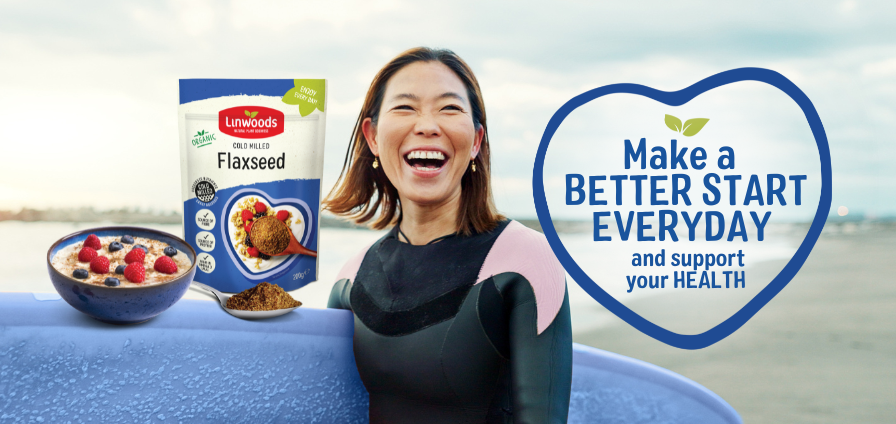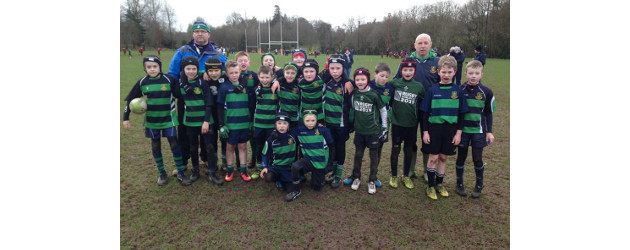Nutritionist Jane McClenaghan Shares Expert Tips on Increasing Energy Naturally with Food.
As part of Linwoods’ _Make a Better Start_ campaign, one key focus area is helping people improve their energy levels naturally in 2025.
Nutritionist Jane McClenaghan, with over 20 years of expertise, shares how to increase energy naturally through small changes in diet and lifestyle. Her insights are practical, actionable, and inspiring. Perfect for readers looking to feel their best this year.
To complement Jane’s article, we’ve launched our free Wellness Hub, filled with resources to make healthy living easy and fun. From recipes to expert blogs, the Hub covers everything from digestive health to heart health and beyond. Check it out here: Linwoods Wellness Hub.
In this article, Nutritionist Jane McClenaghan, talks us through ways to increase your energy naturally with Flaxseed. With over 20 years of expertise in nutrition and wellness, Jane is Northern Irelands most recognised Nutritionist.
INCREASE YOUR ENERGY LEVELS THROUGH FOOD
If you could do with a boost in energy levels, then a few little changes to your diet and lifestyle could make all the difference.
There are lots of reasons why our energy levels can take a dip at this time of year. From lack of daylight and changes in sleep habits, to stress, illness and imbalances in our nutrition.[1] Usually all it takes is a little attention to your diet and a few tweaks to your
lifestyle to help you feel better. Here are some ideas to help give you a lift in energy.
EAT MORE FIBRE
Our bodies produce energy from the food we eat. Foods that are higher in fibre provide a slow and steady supply of energy that can help to sustain your energy for longer.
Adding milled flaxseed to your diet can help keep your fibre topped up, so choose your favourite Linwoods product and get into the habit of having a couple of spoonfuls every day.[2]
One study hints that adding a flaxseed to your daily diet may help reduce mental fatigue. This was the result of a 4 week trial adding 20g flaxseed to diets of a group of children and adolescents with excess body weight.[3]
PRIORITISE PROTEIN
Adding a little extra protein to your plate can help balance blood sugar and support energy too. As a rough guide, aim for a palm-sized portion of protein at main meals.
Adding protein to your plate doesn’t have to mean eating more meat. Get creative with different types of protein. Here’s how:
* Combine Greek yoghurt with some of your favourite Linwoods blends and top with a low sugar granola for breakfast
* Use tahini in your salad dressings and add lentils and chickpeas to your favourite seasonal salads
* Use beans and lentils to bulk out soups and add a seed topper, or some hemp seeds mixed with herbs like rosemary for added interest and some extra protein
ENERGY CO-FACTORS
While our macronutrients provide us with fuel for energy, our micronutrients work as co-factors to help us convert this fuel into energy. If we are low in any of these essential nutrients, we can feel tired or fatigued.
Linwoods Milled Flaxseed, Almonds, Brazil Nuts, Walnuts & Co-Enzyme Q10 contains some of the key nutrients we need as co-factors for energy production:
* B vitamins
* Magnesium – two spoonfuls will give you 15% of your recommended daily intake. Magnesium supports energy metabolism and can help reduce feelings of fatigue and tiredness.
* Selenium
* CoQ10 is the essential nutrient you may never have heard of. One of its most important functions is to support energy production at a cellular level and research suggests that Co-Enzyme Q10 may also increase energy levels.
* Iron is required for the production of red blood cells to store and carry oxygen around the body. If your iron levels are low, you will have fewer red blood cells and your cells and tissues will not be getting the oxygen supply they need, so you can end up feeling exhausted. Linwoods Milled Flaxseed, Almonds, Brazil Nuts, Walnuts & Co-Enzyme Q10 contains 8% of your recommended daily amount of Iron in one 20g serving.
CUT THE ENERGY DRAINS
Some habits will quickly deplete your energy levels and leave you feeing fatigued.
The main dietary energy drains are:
* Too much sugar
* Takeaways and junk food
* White carbs (pasta, rice, bread)
* Alcohol
* Refined and processed foods
* Caffeine
Rather than focussing on cutting these things out, it can be easier to load more of the good stuff into your diet. That way you are likely to feel better and that can make it easier to reduce these energy drains.
STAY WELL HYDRATED
One of the first signs of fatigue is dehydration, so keep your water intake topped up. If you are not keen on drinking water in the colder months of the year, choose some of your favourite herbal teas, or keep have hot water and lemon for a refreshing and warming drink.
GET OUTSIDE MORE
If you are cooped up indoors at this time of year, the lack of daylight can affect your sleep wake cycle, and leave you feeling like hibernating. Take a walk outside an get your daily hit of sunshine or grey skies. The more daylight you can catch at this time of year, the better.
GET MOVING
Although you might not feel like it, exercise can often help you to feel better. Get out for a walk, or just dance around the kitchen.
Remember that fatigue that is not relieved by a good night’s sleep and plenty of rest can have an underlying medical cause, so it is always advisable to chat to your GP about this.
REFERENCES
[1] www.nhs.uk/live-well/sleep-and-tiredness/self-help-tips-to-fight-fatigue/
[2] nutritionj.biomedcentral.com/articles/10.1186/1475-2891-10-44
[3] pubmed.ncbi.nlm.nih.gov/33028427/
[4] www.news-medical.net/health/Beyond-Energy-Mitochondrias-Role-in-Diet-and-Health.aspx
[5] www.timeline.com/blog/does-coq10-really-give-you-energy
[6] www.nhsinform.scot/illnesses-and-conditions/nutritional/iron-deficiency-anaemia/
ABOUT THE AUTHOR
Jane McClenaghan is Northern Ireland’s most recognised nutritionist with over 20 year’s experience. Her company Vital Nutrition specialises in developing and delivering group sessions for corporate and community clients both online and in-person as well as running an online membership club and offering one-to-one consultations.
Jane’s knowledge in the subject area of health and wellbeing is unrivalled as indicated by her qualifications, reputation and
experience. Jane’s sessions cover a range of health and wellbeing topics from mental health to stress, female and male health, healthy
eating on a budget, heart health, sleep, family wellbeing and much more.
________________________________________
Jane is also the author of two books on nutrition, she writes a weekly column in the Irish News, has a monthly slot on radio U105 and is a regular contributor to the BBC, The Belfast Telegraph and many other media outlets.
You can find out more and get in touch with Vital Nutrition here; Vital Nutrition (vital-nutrition.co.uk)










